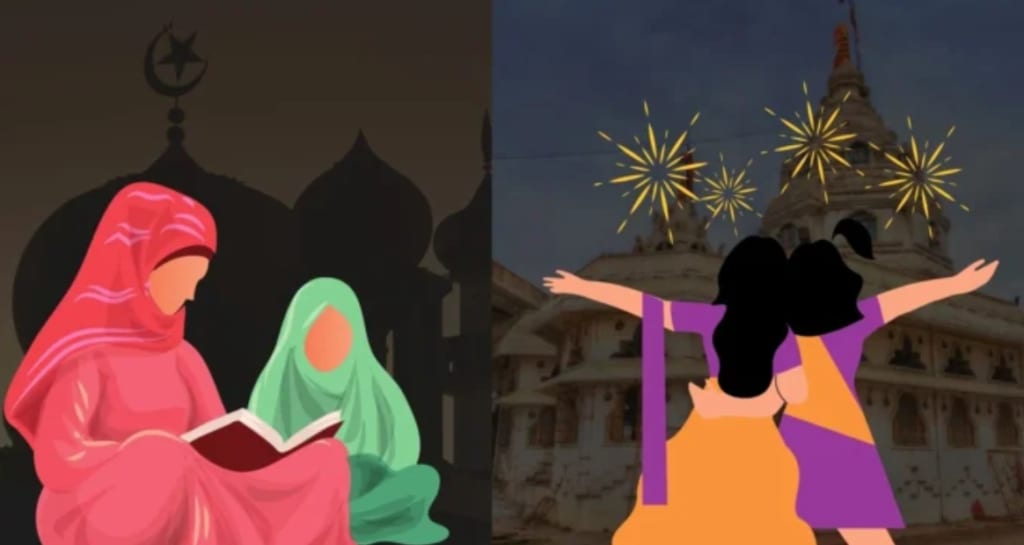Content warning
This story may contain sensitive material or discuss topics that some readers may find distressing. Reader discretion is advised. The views and opinions expressed in this story are those of the author and do not necessarily reflect the official policy or position of Vocal.
The Enduring Influence of Hindu Culture on Pakistani Islam
Influence of Hinduism on Pakistan Culture

Introduction:
The birth of Pakistan in 1947 marked a pivotal moment in the history of the Indian subcontinent. It was a nation carved out of the British Raj, a homeland for the Muslims of the region, a separation from the predominantly Hindu India. Yet, despite this division, the centuries-long tapestry of shared history and cultural exchange between Hinduism and Islam in the subcontinent has woven an enduring legacy, leaving an indelible mark on Pakistani Islamic thought and practice.
Syncretic Sufi Traditions:
This legacy is most vividly illustrated in the vibrant tapestry of Sufi traditions that have flourished in Pakistan. Sufism, the mystical branch of Islam, has long embraced a syncretic approach, incorporating elements of Hindu philosophy and ritual practices into its core beliefs and practices. This fusion is evident in the veneration of Sufi saints like Lal Shahbaz Qalandar, whose shrines stand as testaments to a harmonious blend of Islamic devotional practices with Hindu-influenced concepts like shrine worship, meditation, and the veneration of spiritual guides. The music, poetry, and spiritual practices of many Pakistanis bear witness to this rich tapestry of cultural exchange, where the boundaries between Hinduism and Islam blur, creating a unique and vibrant expression of faith.
Influence on Islamic Festivals and Rituals:
The influence of Hindu culture extends beyond the realm of Sufism, permeating the fabric of Islamic festivals and rituals celebrated in Pakistan. The celebration of the Prophet Muhammad's birthday, known as Mawlid, often incorporates elements of Hindu-style festivities, such as the lighting of lamps, singing, and the distribution of sweets. This blending of traditions reflects a deep-rooted cultural exchange, where the lines between religious celebrations become blurred, creating a shared experience of joy and festivity.
Furthermore, Pakistani Muslims have adopted certain Hindu ritual practices, such as the application of henna, into their Islamic wedding ceremonies. The use of amulets and talismans, common in Hinduism, has also found its way into some Islamic folk beliefs and customs in Pakistan, demonstrating the enduring influence of Hindu culture on the everyday lives of Pakistani Muslims.
Architectural and Artistic Synergies:
The architectural and artistic traditions of Pakistan also bear witness to the interplay between Hindu and Islamic influences. Many historic mosques, shrines, and palaces in Pakistan feature Hindu-inspired elements like domes, arches, and intricate stone carvings, reflecting a shared aesthetic sensibility that transcends religious boundaries. Similarly, traditional Pakistani artwork, textiles, and music often blend Islamic calligraphic motifs with Hindu-influenced designs and instruments, creating a harmonious fusion of artistic expressions that speaks to the long history of cultural mingling in the region.
However, this syncretic approach, while enriching the cultural heritage of Pakistan, has also become a source of tension and debate within the Islamic community. Some conservative and puritanical factions view the incorporation of Hindu elements as a dilution or corruption of true Islamic faith, advocating for a "purification" of Pakistani Islam by stripping away perceived "un-Islamic" influences. This perspective has led to conflicts and challenges for those who view the Hindu-Islamic synthesis as an integral part of their cultural identity, a reflection of their unique history and heritage.
Tensions and Debates:
The debate surrounding the influence of Hindu culture on Pakistani Islam highlights the complex and often contradictory nature of cultural and religious identity. While some see the syncretic approach as a testament to the richness and diversity of Pakistani culture, others perceive it as a threat to the purity of Islamic faith. This ongoing tension reflects the dynamic interplay between tradition and modernity, between the desire for cultural preservation and the pursuit of religious purity.
Despite these tensions, the enduring influence of Hindu culture on Pakistani Islam remains undeniable. From the mystical traditions of Sufism to the vibrant celebrations of Islamic festivals, from the architectural marvels that blend Hindu and Islamic elements to the everyday practices that reflect a shared cultural heritage, the echoes of Hinduism resonate throughout the fabric of Pakistani society. This legacy serves as a reminder of the complex and multifaceted nature of cultural identity, where the boundaries between religions and cultures often blur, creating a unique and vibrant tapestry of human experience.
Conclusion:
The story of Pakistani Islam is not simply a tale of religious separation but a testament to the enduring power of cultural exchange, a story of shared history and intertwined traditions. It is a story that continues to unfold, shaped by the ongoing dialogue between tradition and modernity, between the forces of unity and division. As Pakistan navigates its complex identity, the echoes of Hinduism will continue to resonate, reminding us of the rich and multifaceted legacy that binds the people of the Indian subcontinent together.
About the Creator
Enjoyed the story? Support the Creator.
Subscribe for free to receive all their stories in your feed. You could also pledge your support or give them a one-off tip, letting them know you appreciate their work.





Comments
There are no comments for this story
Be the first to respond and start the conversation.